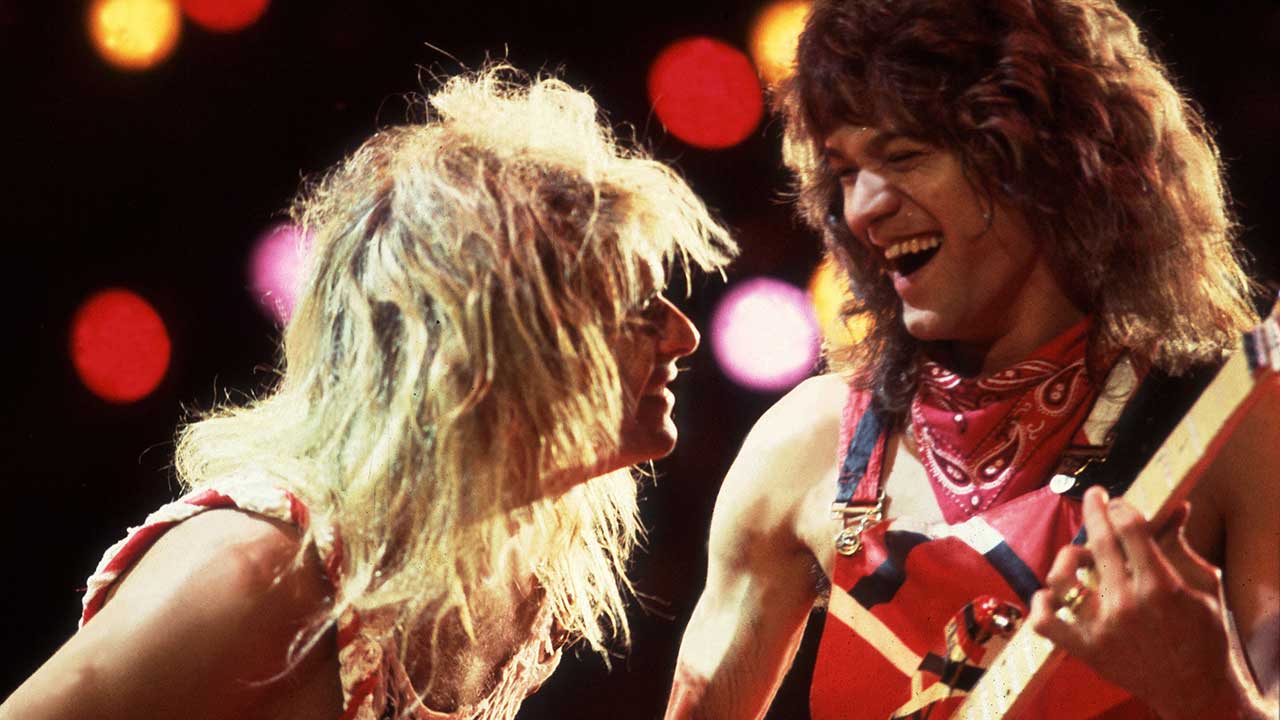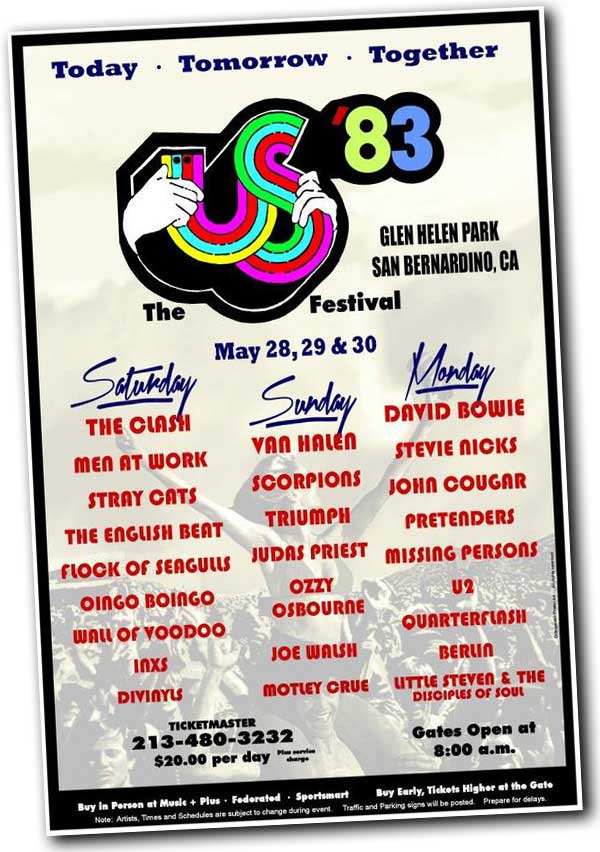
By the early 80s, a sea change began unfolding in mainstream music, with the radio-friendly New Wave acts finding themselves in competition for airplay with the emergent siege of metal bands from both sides of the Atlantic.
By 1983, the metal revolution was well underway and, powered by heatseeking new releases from the likes of Iron Maiden, Def Leppard, Dio and Ozzy Osbourne, it showed little sign of abating. The deciding battle, both literal and figurative, would occur at the 1983 US festival.
With a budget of $12.5 million, Apple co-founder Steve Wozniak put on the first US Festival on Labor Day weekend in 1982. The festival drew over 400,000 people to the dusty Southern California town of Devore to hear bands like the Grateful Dead, Talking Heads and Tom Petty.
Approximately nine months later, over Memorial Day weekend, Woz put on the 1983 US Festival at the same site, attracting even bigger names such as David Bowie, U2, The Clash and Van Halen.
This time around, the festival was carved up into three genre-specific days: New Wave Day on May 28, Metal Day on May 29 and Rock Day on May 30. A fourth day, Country Day, was scheduled for the following weekend. Early trouble emerged when the Clash – the New Wave Day headliners – threatened not to play after learning that Metal Day headliners Van Halen were being paid a cool $1 million for their appearance, twice as much as their own fee.
Ultimately the Clash did play – behind a banner that said “The Clash Not For Sale.” Festival organisers responded by flashing an image of their $500,000 pay cheque on the giant video screens during a portion of their set. The band looked worn out, and Mick Jones left four months later.
Ironically, when Van Halen, headlining Metal Night, learned that David Bowie was promised the same $1 million fee as they were, they pointed to a clause in their contract that stipulated they would be the highest paid act at the event. Woz thus shelled out an extra $500,000 to the band, which resulted in the Guinness Book of World Records creating a new category for Highest Amount Paid to an Act for a Single Performance.
To open Metal Day, the relatively-unknown Mötley Crüe were air-lifted to the festival via helicopter, with frontman Vince Neil reportedly amped on Jack Daniels and pills, and “a blonde head bobbing up and down in [his] lap.” The highly-energetic, 45-minute set showcased the band at the top of their game and on the heels of the performance, the release of Shout At The Devil just four months later would catapult them into platinum-certified superstardom.
The second day’s attendance eclipsed that of New Wave Day. It was later reported that out of a total 670,000 tickets sold for all four days, 375,000 were sold to fans of the metal bands and Metal Day went on to set a new single-day concert attendance record.
Surrounded by the dry, crumbling mountains of San Bernardino, the sporadic winds kicked up swirling cyclones of dust, covering fans and bands alike. A 300-yard long pit stretched back from the front of the stage and as the crowd surged forward, one official compared the scene to “The Fall of Saigon,” as security pulled one sweat and dust-covered punter after another over the barrier and into safety.
Riding high on momentum from their third album, Metal Health, fan favourites Quiet Riot plowed through a nine-song set that included Come On Feel The Noize, ending with the exceedingly-appropriate Metal Health (Bang Your Head). They would soon become the first ever metal band to reach number 1 on the Billboard chart. Ozzy Osbourne and Judas Priest rounded out the early sets with the latter band riding high on the bottomless US thirst for You’ve Got Another Thing Coming, Priest’s first (and only) track to hit the US charts.
By the time Triumph took the stage, the mayhem of the pit reached frightening new levels. Triumph bassist Michael Levine said of the crowd, "They've taken every drug they had, drunk all the liquor they could grab and are busy frying in the sun. I guess they're having a good time."
Next came the Scorpions who whipped the California crowd into a dusty, fist-pumping frenzy. Still supporting the Blackout album, they delivered a dynamic set featuring a glitzy light show and stadium-shaking bangers like No One Like You, Dynamite and The Zoo.
Backstage, Van Halen were celebrating like a band getting $1.5 million for a single performance. On the pathway leading to their half-acre compound, a sign read, “No virgins, Journey fans or sheep allowed on trail.” Four bartenders stood ready to serve the expected party crowd of 500.
Van Halen eventually took the stage, albeit late, with Roth, looking seriously impaired. According to Wozniak in his memoir iWoz: Computer Geek to Cult Icon, Roth was “practically falling down onstage. He was so drunk, slurring and forgetting lyrics and everything.”
Playing up to the fans, Roth shouted, “More people have been arrested today alone than the entire weekend last year! You a bunch of rowdy motherfuckers!” He also paused to put the boot into the Clash, swilling from a bottle of Jack and telling the crowd, “I wanna take the time to say that this is real whiskey here. The only people who put iced tea in Jack Daniels bottles is The Clash, baby!”
Onstage, Eddie Van Halen cemented his status as the preeminent guitarist of his generation with his jaw dropping fretboard dexterity on anthems like Unchained, Ain’t Talkin’ ‘bout Love and You Really Got Me. Across twenty-four crowd-thrilling belters, Van Halen removed any doubt as to who sat atop the rock pantheon and put the world on notice that heavy music had set its sights on the mainstream.
In the end, 1600 people were treated for primarily minor injuries and there were 87 arrests. Two fatalities also occurred: one man fatally overdosed and another was beaten to death in the parking lot as the result of a drug deal gone horribly wrong. Two people were arrested in connection with the murder.
Over the span of both festivals, Woz reportedly lost around $20 million and soon returned to working at Apple. Although the ensuing headlines would largely feed the negative stereotypes for metalheads, in the final balance, the biggest winner of the festival was heavy metal, exposing the public’s heroic appetite for heavy, guitar-powered music.
All of the Metal Day bands would proceed to reach new commercial heights (Triumph would release their biggest all-time hit three years later), leaving little doubt as to where the direction of the mainstream now pointed.
As Vince Neil would famously say, “It was the day new wave died and rock'n'roll took over."








